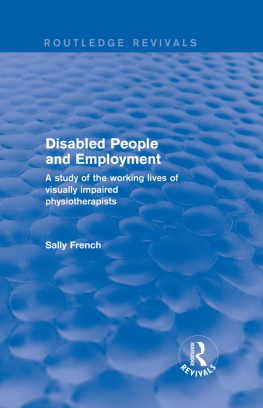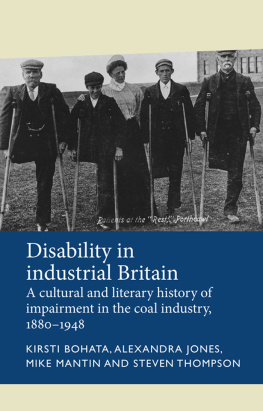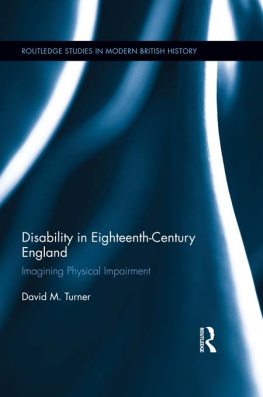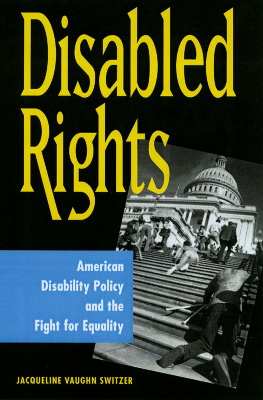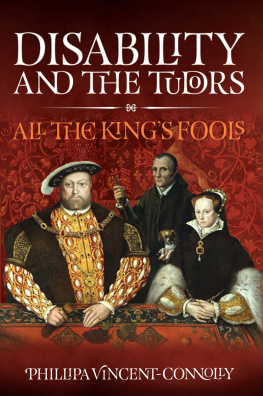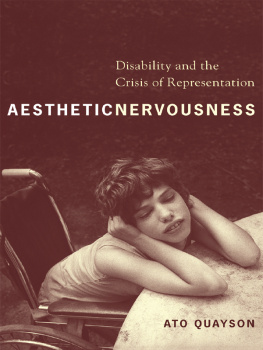First published 2001 by Ashgate Publishing
Reissued 2018 by Routledge
2 Park Square, Milton Park, Abingdon, Oxon, OX14 4RN
711 Third Avenue, New York, NY 10017, USA
Routledge is an imprint of the Taylor & Francis Group, an informa business
Copyright Sally French 2001
All rights reserved. No part of this book may be reprinted or reproduced or utilised in any form or by any electronic, mechanical, or other means, now known or hereafter invented, including photocopying and recording, or in any information storage or retrieval system, without permission in writing from the publishers.
Notice:
Product or corporate names may be trademarks or registered trademarks, and are used only for identification and explanation without intent to infringe.
Publisher's Note
The publisher has gone to great lengths to ensure the quality of this reprint but points out that some imperfections in the original copies may be apparent.
Disclaimer
The publisher has made every effort to trace copyright holders and welcomes correspondence from those they have been unable to contact.
A Library of Congress record exists under LC control number: 2001091919
ISBN 13: 978-1-138-72612-3 (hbk)
ISBN 13: 978-1-315-19156-0 (ebk)
This book and the research upon which it is based, is about disabled people and their employment. It focuses in particular on the barriers disabled people experience at work and the ways in which they overcome, minimise or manage these barriers. It is hoped that this book will provide insights into how disabled people experience and cope with their work at a practical, personal and social level and how changes in legislation, policy and values can impact on their working lives.
Although there are many studies concerning disabled people and employment (see ), there is very little from the perspective of disabled people themselves (Barnes et al 1998). Kitchin et al state:
There has been little research to tease out and document the specific mechanisms, structures and processes that underlie disabled people's access to the labour market; or how these processes interact and manifest themselves in different contexts; or an indication of the experiences of disabled people seeking access to the workplace or their experiences within the workplace. (1998: 788)
This book, aims to investigate employment from the direct experiences and perspectives of disabled people themselves. It is based upon a study of visually impaired physiotherapists but it is likely that much of what they experience can be generalised to other disabled people. The book is written from the author's PhD thesis (French 2000) where detail of methodology is given.
Visually Impaired People in the Physiotherapy Profession
Visually impaired people have been accepted for registration by the professional body of physiotherapy (now the Chartered Society of Physiotherapy) since 1916 but have been formally trained since 1895, This can, in many ways, be viewed as an historical accident as physiotherapy developed from massage which visually impaired people traditionally practised (Barclay 1994) (see ). Physiotherapy is unique among the professions in recruiting substantial numbers of visually impaired people who, until 1995, received their training in a special college run by the Royal National Institute for the Blind (RNIB). Visually impaired people are, however, employed in other professions including social work and law (Simkiss et al 1998).
The Profession of Physiotherapy
Physiotherapy originated from nursing at the end of the 19th century and originally consisted of treatments using massage. Over the years, however, it has undergone many developments and is now the largest profession supplementary to medicine in Britain with approximately 26,000 people registered as members of the Chartered Society of Physiotherapy (CSP). In the recent career literature of the CSP, physiotherapy is defined as follows:
...a healthcare profession which views human movement as central to the health and well-being of individuals. Physiotherapists identify and maximise movement potential through health promotion, preventive health care, treatment and rehabilitation. The core skills used by chartered physiotherapists include manual therapy, therapeutic exercise and the application of electrophysical modalities. Fundamental to the physiotherapist's approach, however, is an appreciation of the psychological, cultural and social factors which influence their clients and the patients' own active role in helping themselves. (1998: 2)
They go on to say that:
Chartered physiotherapists work to combat a range of physical problems, in particular those associated with neuromuscular, musculoskeletal, cardiovascular and respiratory systems. (1998: 3)
Physiotherapy is a diverse health care profession with opportunities to work in many specialities and many settings. Physiotherapists work within the National Health Service (NHS), special schools, private practice and industry. Specialities include, sports injuries, intensive care, orthopaedics, mental health, learning difficulties, palliative care, paediatrics and neurology. Physiotherapists are also involved in health education and health promotion. This book will focus primarily on visually impaired physiotherapists working within the NHS in a wide variety of specialities.
Physiotherapy became an 'all degree' profession in 1992 and has gradually been transferred from small NHS colleges to the university sector. Courses lead to a B.Sc. Honours degree in Physiotherapy after a three or four year period of study. There is now considerable variation among the courses but they all contain theoretical, practical and clinical components. All the courses are validated, not only by the universities, but by the CSP and the Council for Professions Supplementary to Medicine (CPSM) which administers state registration.
To work within the NHS it is necessary to become State Registered. Once qualified, physiotherapists usually practise as junior physiotherapists for approximately two years within the NHS. They then progress to the grade of Senior 2. In both of these clinical grades physiotherapists usually 'rotate' to different specialities in order to gain wide experience. The top clinical grade within the NHS is that of Senior 1 which many physiotherapists achieve within the first five years of their career. In this grade physiotherapists usually specialise in a particular area and frequently have the responsibility of teaching and assisting junior staff and physiotherapy students.

